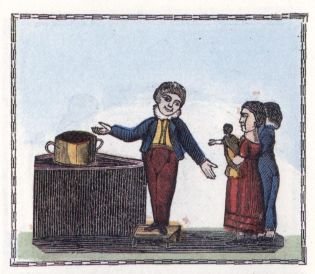Peter Piper
| "Peter Piper" | |
|---|---|
 Illustration from Peter Piper's Practical Principles of Plain and Perfect Pronunciation (1836 American ed.) | |
| Nursery rhyme | |
| Published | 1813 |
"Peter Piper" is an English-language nursery rhyme and well-known alliteration tongue-twister. It has a Roud Folk Song Index number of 19745.[1]
Lyrics
[edit]The traditional version, as published in John Harris' Peter Piper's Practical Principles of Plain and Perfect Pronunciation in 1813, is:
- Peter Piper picked a peck of pickled peppers,
- A peck of pickled peppers Peter Piper picked;
- If Peter Piper picked a peck of pickled peppers,
- Where’s the peck of pickled peppers Peter Piper picked?[2]
Common modern versions include:
- Peter Piper picked a peck of pickled peppers.
- If Peter Piper picked a peck of pickled peppers,
- How many pickled peppers did Peter Piper pick
- if he picked a peck of pickled peppers?[citation needed]
Origins
[edit]The earliest version of this tongue-twister was published in Peter Piper's Practical Principles of Plain and Perfect Pronunciation by John Harris (1756–1846) in London in 1813, which includes a one-name tongue-twister for each letter of the alphabet in the same style. However, the rhyme was apparently known at least a generation earlier.[3] Some authors have identified the subject of the rhyme as Pierre Poivre, an eighteenth‑century French horticulturalist and government administrator of Mauritius, who once investigated the Seychelles' potential for spice cultivation.[4][5]
Peter Piper Principle
[edit]The Peter Piper Principle is a cognitive error that people make, where they tend to confuse two words that resemble each other; in particular, when the first letter(s) are the same. Studies have shown that this applies when people confuse the names of other people (although other tendencies also apply).[6][7]
Novelists are well aware of the peril of giving two characters names that start with the same letter, because readers have a tendency to get them confused.[8][9] Names of medications also tend to be confused when they start with the same few letters.[10]
References
[edit]- ^ "English Folk Dance and Song Society Song Index". Vaughan Williams Memorial Library. Retrieved 15 September 2020.
- ^ "Peter Piper Picked a Peck of Pickled Pepper nursery rhyme music and lyrics".
- ^ H. Carpenter and M. Prichard, The Oxford Companion to Children's Literature (Oxford University Press, 1984), p. 408.
- ^ Hassall, S.; Hassall, P.J. (1988). "Exploration, Discovery and Settlement". Seychelles. Places and People of the World. Chelsea House. p. 26. ISBN 0-7910-0104-0.
- ^ Lionnet, Guy (1972). "Geography, Geology and Government". The Seychelles. The Islands Series. Stackpole Books (U.S.)/David & Charles (UK). p. 28. ISBN 0-8117-1514-0.
- ^ Deffler, Samantha A.; Fox, Cassidy; Ogle, Christin M.; Rubin, David C. (22 April 2016). "Table 3 Phonetic Similarity Between Correct Name and Misname". Memory & Cognition. 44 (7). Springer: 989–999. doi:10.3758/s13421-016-0613-z. hdl:10161/11918. PMID 27106910. S2CID 26651199.
- ^ Marissa Higgins, Marissa Higgins (19 May 2016). "This Is Why You Confuse People's Names Sometimes". Bustle. Retrieved 2 October 2022.
- ^ Weiland, K.M. (23 March 2011). "How to Avoid Confusing Readers With Similar Character Names". Helping Writers Become Authors. Retrieved 2 October 2022.
When an author has given names beginning with the same letter to more than one character, this can confuse readers.
- ^ Tunley, Alison (17 May 2022). "Alphabetic name confusion & failing to keep up with the Kardashians". Rosetta Translation. Retrieved 2 October 2022.
Novelists are well aware of the peril of giving two characters names that start with the same letter because readers have a tendency to get them confused.
- ^ "List of Confused Drug Names". Recommendations. Institute for Safe Medication Practices (ISMP). 26 July 2023. Retrieved 3 May 2024.
External links
[edit]- Text of Peter Piper's Practical Principles of Plain and Perfect Pronunciation at Project Gutenberg
Peter Piper public domain audiobook at LibriVox